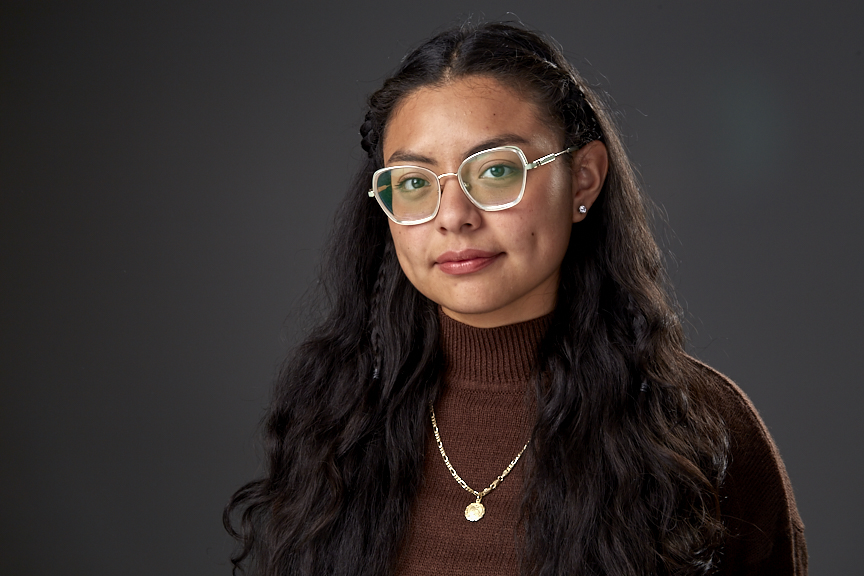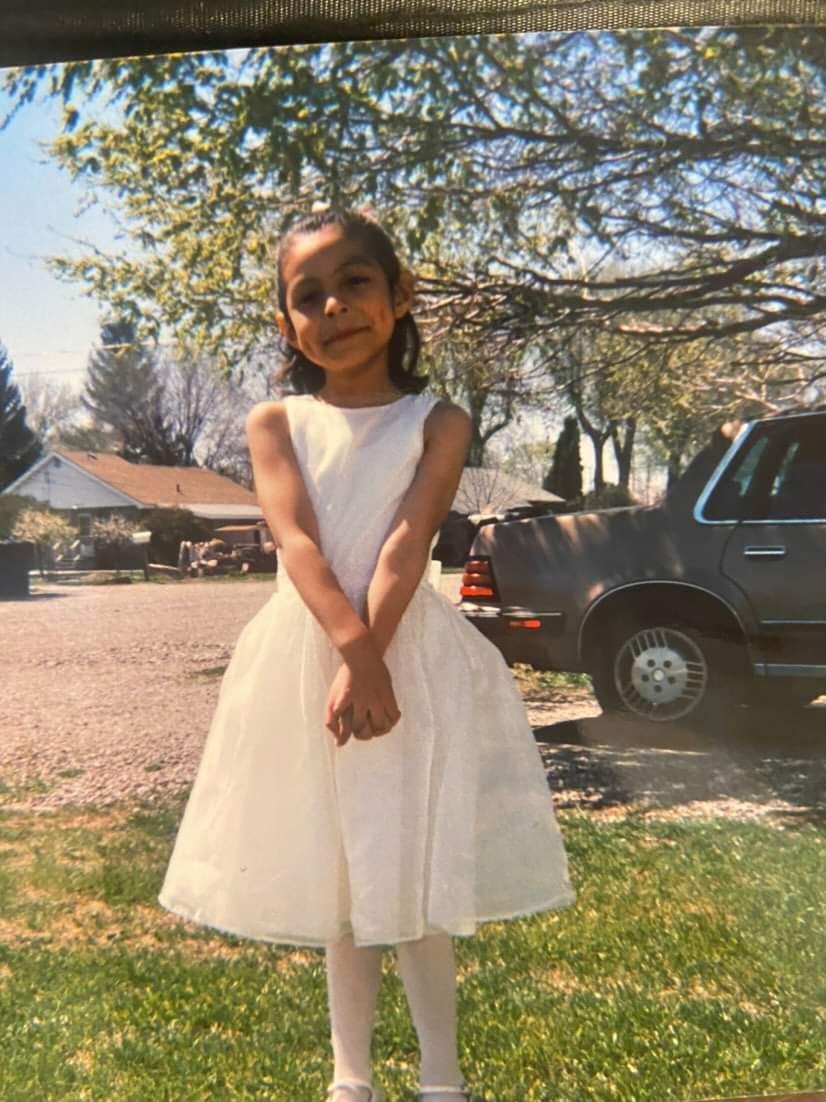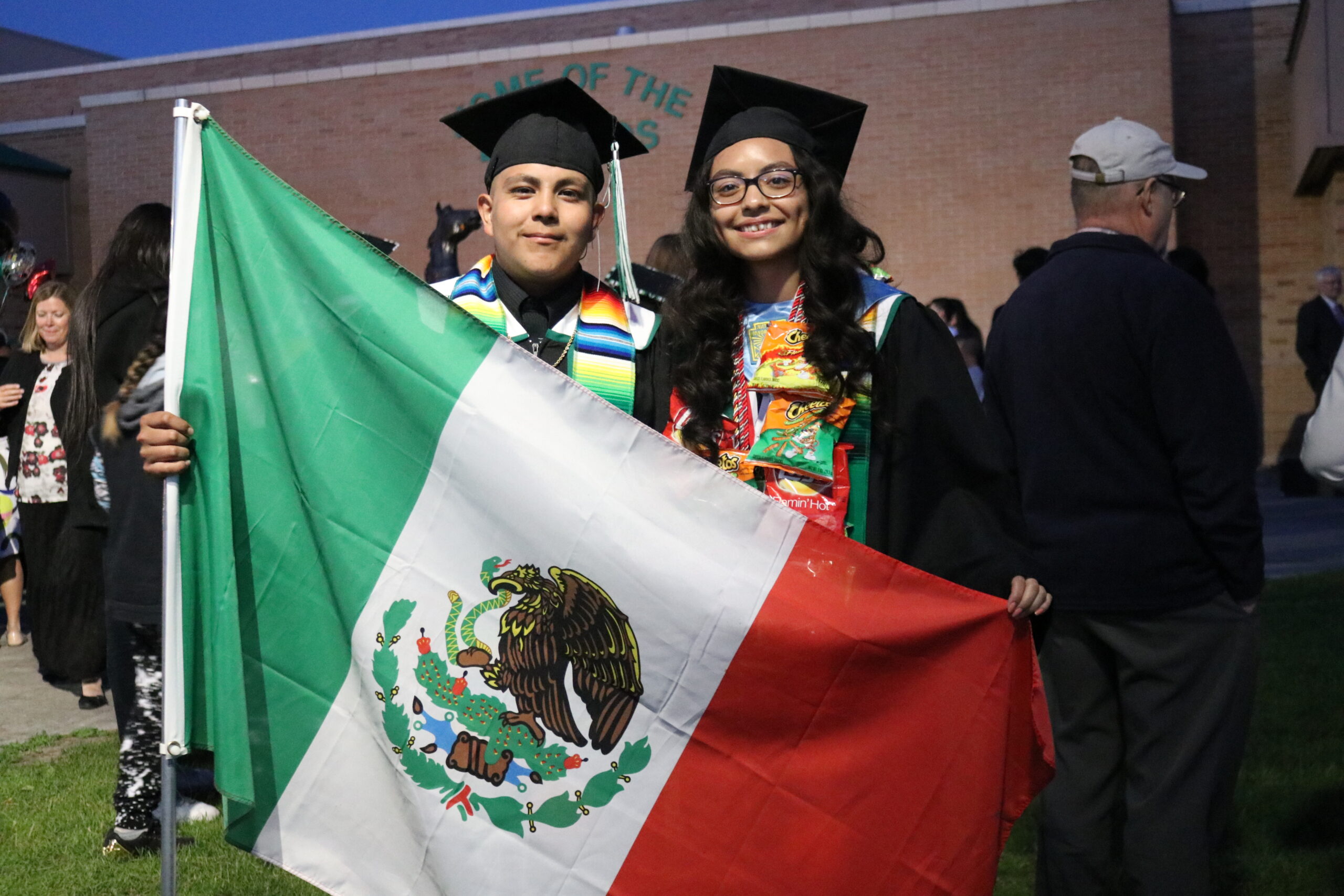Damaris

Damaris was born in Pocatello and raised in Blackfoot, Idaho. Along with her three siblings, she attended schools in Idaho, including Stoddard Elementary, Blackfoot Sixth Grade, Mountain View Middle, and Blackfoot High School. From a young age, Damaris loved reading and enjoyed spending time in her school library.
As Damaris shared, even when her school environment was not as positive, she valued her education and tried to remain positive to keep learning. But Damaris described experiencing lot of racism and discrimination, including from her peers after the 2016 election. Despite sharing these concerns with school administrators, she explains nothing has changed.
Damaris recently graduated from the College of Idaho, where she received a Bachelor of Arts in Business Administration and History.
*The following interview has been edited for clarity.
What does it mean to you to identify as a Latina student in Idaho?

I think a lot of it is rooted in my family, including my parents and their history. When they came to the States, from Guerrero, Mexico, they had a whole story and a whole experience in that alone. My mom and dad came when they were still very young. So, I feel like part of me identifying as a Latina, and as a student is remembering, recognizing, and honoring their story. Because they valued it enough to keep this identity a consistent part of our lives, our culture, and our language. A lot of the times growing up, it was something that people wanted to stifle. So, for me, it is really important that people know that I am a Latina or Latinx person in a space because we exist. And I’m not going to ignore our entire family history because that’s really important to who we are as people.
Did you ever feel like you could not express your Latina identity in your schools in Blackfoot?
I feel like that was the overwhelming experience and environment that they created. Sometimes, it was obvious from the get-go that it [Latinx identity] was something they did not want to encourage. I think a lot of my peers felt the same way, that we could not be who we are, or we could not be who our family raised us to be because it did not fit the mold of the dominant culture that existed around us.
This happened at every school I went to starting from kindergarten. But when I got to high school, that is when the experience became very negative and I saw more direct discrimination and microaggressions against us. I was in high school around 2015 or 2016, right around the [presidential] election, so a lot of people were empowered by very negative and discriminatory thinking and ideologies, and they became very comfortable sharing that with us. And this was the most stressful time in my entire educational experience in Idaho.

Do you feel comfortable sharing an instance when you faced discrimination in your school in Blackfoot?
The day of Donald Trump’s election announcement, my family was very sad. My brother broke the silence as we watched the results on TV and said, “When you all go to school and work tomorrow, you have to be strong because people are going to say something to you.” We understood the impact [Trump] was having in our local community, and in Blackfoot, so we anticipated that there would be a negative impact on us as a Latino family living there.
I remember going to school the next day and, just like my brother had said, we had all the jokes in the books and all the misguided comments like “you should go back to your country” and students saying these dangerous ideas that Mexican people are violent or rapists. And they didn’t just target Mexicans, they would also talk about the Muslim community as terrorists and say very harmful and dangerous stereotypes. A student even got up and started yelling at another student that she was a baby killer because she supported abortion rights.
At that moment, I had to swallow a lot of my personal pain. I had grown up around all these people. Blackfoot is a small community, so all the students knew each other from kindergarten and all through high school. We grew up with each other. And it was even more difficult to see my teacher, who is also Latina, having to mediate those conversations. So, when I got to my American History class later that day, I just broke down. I couldn’t stop thinking of what I had watched all day and experienced and seeing my [Latina] teacher have to limit and hide herself and hide how we really feel because we did not feel safe enough in the community around us to vocalize our feeling and experiences.
What did your school do after this experience?
My teacher took me to the principal’s office, and they had all the administrators there and the school police, and they asked me what was wrong as I kept crying. I explained what I had been going through the entire day, and what I had seen other students going through, but they [school administrators] did not seem as concerned. They just wanted the names of specific students who were saying all this stuff. But I did not know how to tell them [names] because it was pretty much everybody. I don’t know if it would have made a difference giving them names, but now that I am older, I feel comforted that I did not say anyone’s name because at the time I was thinking about my well-being. I knew if I said somebody’s name, people would know it was me, and that would have added on so much more harassment and discrimination than what I already had.
My school didn’t do anything. That seemed so crazy to me because if I can’t give them the name of every student that I heard say something, but it was clearly a larger issue, they could have still done something in general. I don’t think they needed me to point out one student specifically. A lot of other students were experiencing this, as well, but nothing happened.
The administrators never called my parents to tell them what had happened. I never told my family about this experience until years later when I shared it with my younger sister. But this is one of the biggest memories for me because I became jaded to the discrimination since it was so frequent. [That day] was the one time when I felt like someone could have done something, but they chose not to. And I have no idea why they didn’t do anything, maybe they just didn’t think of it as a larger problem.
Did you encounter similar experiences after this?
As a senior in high school, I took an american government course, and I knew my teacher had horrible ideologies. He once assigned a quiz that would show us where we fall on the political spectrum, but it was very outdated. On one end you were a Communist and on the other end you were considered KKK, or white supremacist. Every student took the quiz and we had to raise our hand to talk about whether we leaned left or right.
I landed on the Communist end, even though the quiz asked things like, “do you believe people of color deserve human rights?” and “do you believe everybody should have the right to do what they like with their body?” Several students landed on the KKK end of the spectrum, they started high fiving each other in class, and the teacher did not think there was anything wrong with this. In fact, when another student came into our class and started high fiving the students who had KKK results, the teacher singled me out and told them that I had received a Communist result. I don’t know if to him this was worse than being KKK, but if he could have, I know he would have also been high fiving the other students.
The teacher was smart enough to know he could not say things like that to us directly, but he always supported conversations that leaned that way. To put it another way, he would agree with certain student perspectives more than others, and he would question the others more.
Damaris also shared with us two separate instances where a white student compared her to a Latin American prostitute from a fictional story he invented and told her Latinos could only ever amount to be prostitutes. Another time, this student showed her a news article with a list of Spanish last names, asked if her family’s last name was on there, and when Damaris said no, he told her it was all names of rapists.
How do you think these experiences impacted your education?
I was fortunate enough to have a family that always encouraged me and supported us in those difficult moments. We wouldn't talk about it, but we knew what we had all gone through because my older brother and sister went to the same schools and had the same experiences. So, it was like an unsaid thing, but we were there for each other. I feel like it pushed me to have to fight harder. There were times where a lot of the treatment was unjust, and I just had to take it because it was easier to take it than to fight against it at the time because fighting against it would have brought on even more than I could handle as a student. I don’t think I should have had to deal with this, but I did. For other students, I think it did influence their self-worth and their ability to believe in themselves.
And these experiences still impact me to this day. When I go to an employer I have to know what’s going on around me for my own safety and well-being. I want to make sure that hopefully these things don’t happen again, but unfortunately, they do. I don’t think many people realize it’s something that you carry with you for the rest of your life. Even though I grew from such a negative experience, and I pursued more, that came out of the need to survive. It did not come from an environment that fostered growth and positive encouragement. I was in a space where I had to fight to succeed and to prove to my community that we deserve it.
What change would you like to see for Latinx students in Blackfoot?
I think schools need to reassess their policies and look at what is a disciplinary issue. Because I think schools tend to use these policies as excuses to label students that are “harder to educate” or to discourage them from pursuing an education. I also think schools need more cultural awareness and more diversity, equity, and inclusion in the foundation of these schools, not just as a buzzword. Students also need the option of anonymity when bringing complaints about racially hostile environments. Discrimination should not happen, not even once, and there should be a process that immediately addresses these concerns.
The Education Equity for Latinx Students project started in the fall of 2022 as part of our efforts to expand racial justice work on behalf of Idaho students, beginning with Latinx communities.
READ MORE STORIES AND LEARN ABOUT THE EDUCATION EQUITY FOR LATINX PROJECT
